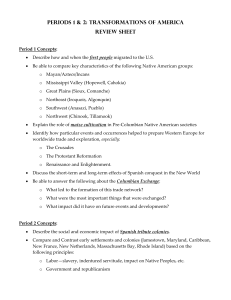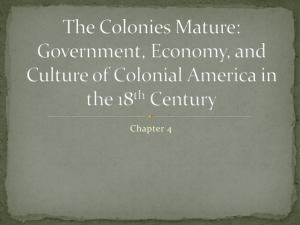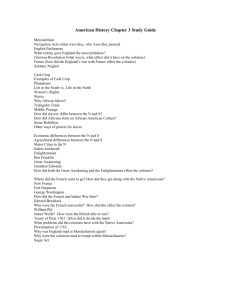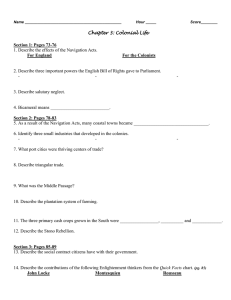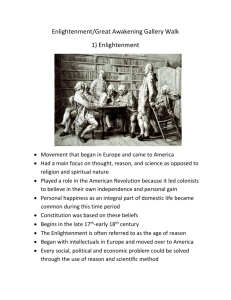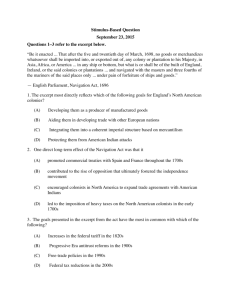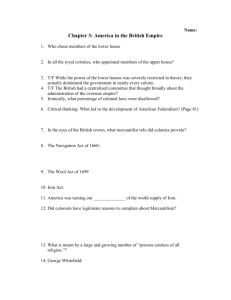File
advertisement
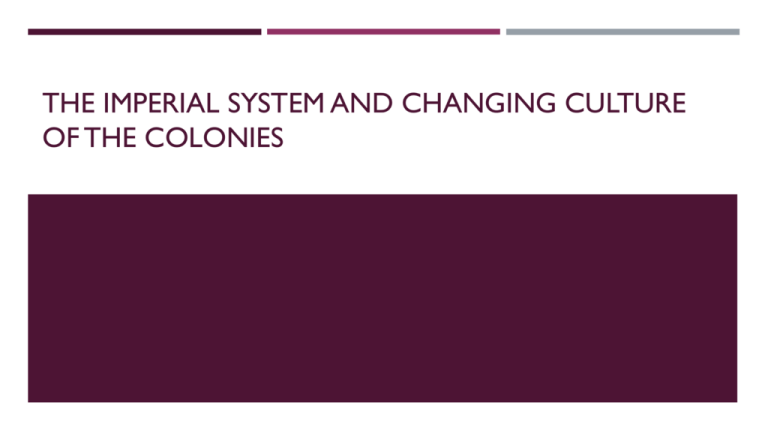
THE IMPERIAL SYSTEM AND CHANGING CULTURE OF THE COLONIES MERCANTILISM Mercantilism: a set of ideas on how a Country should conduct economics Accumulate as much gold and silver as possible (usually through colonies and trade) Self-sufficient in raw materials Prevented colonies from selling goods to other nations (only mother country could) THE NAVIGATION ACTS 1660, Charles II takes over throne Wanted to regulate trade in colonies Parliament passes Navigation Acts (1660) The Navigation Acts: required all goods imported or exported from the colonies to be carried on English ships, also contained lists of raw materials that could be sold only to England List included sugar, tobacco, lumber, cotton, wool, and indigo Forced colonists to deal with English merchants only, whom of which would raise prices high for profit THE STAPLE ACT Three years after Navigation Acts (1663) Staple Act: required everything the colonists imported to come through England first All merchants from other countries had to stop in England, pay taxes, and then travel to the colonies Caused other goods to be more expensive for colonists TOLERATION ACT English Bill of Rights produced after William and Mary succeed throne in the Glorious Revolution of 1688 English Bill of Rights: granted more power to Parliament and restricted Kings and Queens with certain duties (taxes, gave freedom of speech, banned cruel and unusual punishment) Toleration Acts were also passed later that year with the English Bill of Rights Toleration Acts: granting freedom of worship to almost all Protestants but not to Catholics or Jews English Bill of Rights would foreshadow the creation of the U.S. Bill of Rights JOHN LOCKE Wrote Two Treatises of Government Believed in political obligation to human rights and justified revolutions of Governments All people are born with natural rights given by God Government’s and the people were in social contracts (if violated by Government, the people had the right to overthrow it) POPULATION GROWTH IN COLONIES Average of 7 children per household From 1640-1700, population increased from 25,000 to more than 250,000 people in Colonies By the American Revolution, the population would be 2.5 million people IMMIGRATION Besides high numbers of births, immigration played a major part in the population growth German, Scottish, Irish, and Jewish populations all looked to America for religious freedom, freedom from oppression, and/or economic opportunities Immigrants would settle in major cities and would also expand Westward for cheaper and more available land AFRICANS IN COLONIAL AMERICA Independent African culture due to slavery and lack of influence around other cultures Traditional religious beliefs mixed with Christian values to create to ideologies on religion Music became deeply rooted in African American culture Separated families happened regularly, thus African American’s began to use more unique names in order to pass on their family name and heritage Were beaten, branded, treated like animals, even killed if tried to run away or rise up against the violence and mistreatment THE ENLIGHTENMENT Enlightenment thinkers believed that natural laws applied to social, political, and economic relationships This emphasis on logic and reasoning was known as rationalism John Locke was a member of the Enlightenment Movement Another Enlightenment member was Baron Montequieu In his work, Spirit of the Laws, believed that Government had 3 parts –executive, legislative, and judicial (sound familiar???) THE GREAT AWAKENING Colonists began to experience pietism Pietism: an European movement that stressed individual devoutness and an emotional union with God (individual being key) Preacher sermons spread the word of Pietism through Revivals Revivals: large public meetings for preaching and prayer Caused spread of more Protestant religious sects such as Methodists and Baptists Supported individualism (focus on ones self) just as Enlightenment period had
